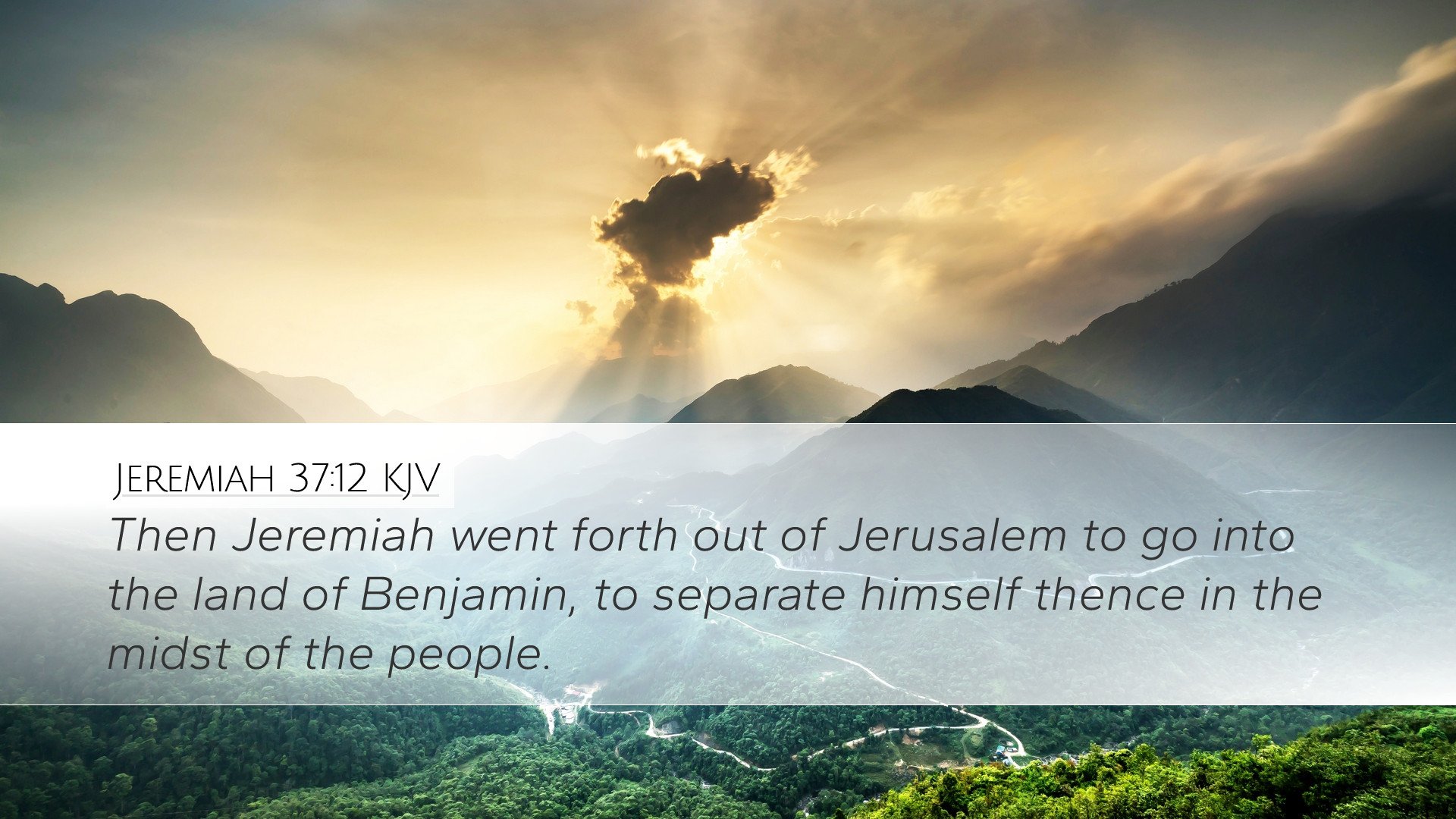Commentary on Jeremiah 37:12
Verse Text: "Then Jeremiah went out of Jerusalem to go into the land of Benjamin, to separate himself thence in the midst of the people."
Contextual Background
The Book of Jeremiah, a prophetic work, reflects the tumultuous period leading up to the fall of Jerusalem. Jeremiah, chosen as a prophet during King Josiah's reign, witnesses the moral decline and impending doom brought on by the people's unfaithfulness to God. By 37:12, Jerusalem is under siege by the forces of King Nebuchadnezzar of Babylon. The prophet's mission is to deliver messages of warning, repentance, and ultimately, hope, even amidst despair.
Exegesis of Jeremiah 37:12
This verse marks a significant moment where Jeremiah attempts to exit Jerusalem. His intention to go into the land of Benjamin, a region north of Jerusalem, carries deeper implications.
-
Purpose of His Journey:
- Jeremiah's journey to Benjamin could be understood as a symbolic act of separation from the sinful city.
- He seeks to align with those who might still hold allegiance to God amidst a corrupt populace.
-
Geographical Significance:
- Benjamin, being part of the larger territory of Judah, signifies the remnant of God's people.
- The land reflects both hope and a tangible connection to the Davidic line, as it is closely associated with significant biblical narratives.
Theological Insights
Jeremiah's actions encapsulate a yearning for spiritual purity and deliverance. His departure is not merely physical but reflects a profound theological significance.
-
Call to Separation:
Jeremiah symbolizes the call for believers to separate themselves from behaviors and environments that lead to compromise.
-
The Role of the Prophet:
Jeremiah's persistence in the face of hostility paints a picture of true prophetic witness—speaking truth in love, even when challenged by societal norms.
Commentary Insights
Matthew Henry
Henry views Jeremiah's departure from Jerusalem not only as a physical journey but as an act of obeying God amidst turmoil. He comments on the symbolic act of separation from a city destined for ruin, emphasizing the steadfastness of a true prophet who cannot share in the judgment that will come upon Jerusalem.
Albert Barnes
Barnes highlights the dismal situation in Jerusalem and how Jeremiah’s intention to leave reflects the broader ruin facing the city. He connects Jeremiah's movement to prophetic tradition where true prophets often find themselves alone, separated from the corrupt societal context around them. He points to the need for discernment and the recognition of God’s sovereignty in the midst of disaster.
Adam Clarke
Clarke offers an exploration of the legal and historical aspects of Jeremiah's intent to travel. He notes the profound implications of the land of Benjamin as a remnant of God's promise to His people. Clarke emphasizes the theological stance of hollowness in Jerusalem, urging believers to remain vigilant and attuned to God’s instruction, even in perilous times.
Practical Applications
The forced separation of Jeremiah poses significant implications for contemporary believers:
-
Understanding Consequences:
Jeremiah's actions remind followers of the consequences of collective sin and the importance of individual faithfulness amidst vibrant unfaithfulness.
-
Embracing Vulnerability:
True prophetic voices may be vulnerable, often finding isolation in their struggles. This vulnerability can lead to a refined faith that seeks God’s guidance regardless of the external chaos.
-
Cultivation of Hope:
In this time of despair, locating oneself in the 'land of Benjamin' symbolizes a return to God’s promises, encouraging believers toward hope and restoration.
Conclusion
Jeremiah 37:12 illustrates a poignant moment of prophetic obedience during a time of immense societal failure. The insights drawn from esteemed commentaries by Matthew Henry, Albert Barnes, and Adam Clarke offer rich theological reflections, practical applications, and essential understanding for pastors, students, theologians, and scholars. This verse calls for reflection on the necessity of separation for purity, the characteristic resilience of prophetic voices, and the continuing promise for those who remain faithful to God in challenging times. As believers navigate their own historical contexts, Jeremiah’s journey inspires courage and steadfastness in faith.


